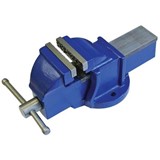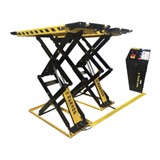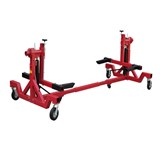Thankfully sanity has set in on exchange rates, but the industry could be facing a far more serious problem with the prospect of Australia losing its last two car makers.
Ford has already announced it will no longer make cars here after 2016, so what if Holden and Toyota up stumps and leave?
Paul Philips, managing director of Benson Machines says the closure of Toyota and Holden factories would have a devastating effect on our metalworking industry with companies to close and jobs to go.
"The critical mass of car part suppliers is a major issue, that's where the value add is for Australia, the manufacture of all the parts of the car. Holden and Toyota are really just assembly plants.
"The problem is if the car industry was to close, it would never come back. The skills would be gone forever, and that would have a cascade effect on other manufacturing industries, making it harder and harder for them to survive.
"And it's not just technical skills, like most other suppliers in the metalworking industry, we have learnt a lot from the car makers, which we pass on to other industries.
"For example, we have learnt about process capability and the way the car industry maintains quality. We are now teaching that to our other customers.
"This is just one small example, there are thousands of others out there of ways the car industry benefits Australia," he said.
Philips points to the upcoming closure of ACL Bearings in Tasmania as a key example of losing expertise.
"The company has developed considerable amount of knowledge in powdered metallurgy technology here in Australia – that will all be gone soon."
Philips says to ensure we have a viable car industry we need to level the playing field, and have reciprocal tariffs on imported cars.
"I'm a free marketeer, I don't like to see import duties, but if other countries have higher tariffs, then we should impose the same. We don't need to make martyrs of ourselves.
"For example, if a country has a 28 per cent import duty on cars then we should have a 28 per cent import duty on their cars. It should be tit for tat," he said.
Philips welcomes the federal government's recent move to force all Commonwealth departments to purchase locally made cars, but says all levels of governments – state and local – should also do the same.
"Of course if someone needs a 4WD or a luxury car, then okay, but really it should be part of all governments' purchasing policies," he said.
Buy local cars
Tony Sprague, director of CNC Machinery Sales Australia, agrees, saying all our governments should be buying 100 per cent locally made cars.
"To me it's ridiculous for a government department to buy anything but an Australian made car.
"There should also be a level playing field for our car makers, the present system where we only put five per cent on imported cars and other countries impose something like 20-25 per cent is crazy.
"Our car industry is one of Australia's major manufacturing sectors and is a strategically important part of the Australian economy.
"And it's not just the actual car makers themselves; it's all the component manufacturers as well."
Sprague points out that while Australia has three car makers at present (Ford to close its Geelong and Broadmeadows assembly plants in 2016) there are over 200 companies directly linked to them, employing around 250,000 workers in total.
"If Holden and Toyota were to go, it would have a major impact on our industry.
"While we don't sell machines direct to the car makers, we do to many of the suppliers to the car industry, big ticket items like machining centres and CNC lathes.
"If the car makers were to close it would be one more nail in the coffin of manufacturing.
"It's vital Australia has a manufacturing industry, we shouldn't have all our eggs in one basket," Sprague said.
Skills lost
While most companies in the metalworking industry would be severely impacted by the closure of Holden and Toyota's manufacturing plants, Kemppi Australia's managing director David Green believes the closures would have minimal impact on his company.
"That might sound strange, but a lot of our business comes from the after-market, from the repair shops and the body shops.
"The car industry uses a lot of robotic welding, where we are big, but not in the automotive welding robotic space.
"But for those players who have a large business with the actual manufacturing of motor vehicles, the robotic welding power source suppliers, they would be severely affected.
"While they have already sold the machines, it's the consumables and guns that are replaced on a regular basis that will impact them," he said.
While it is clear many of the skills learnt in the car industry will be lost, Green says there is a clear global trend in the increase in robotic and automated welding power sources compared to manual welding machines, which are contracting world-wide including countries like China.
"The first reason is productivity; there is a lack of skilled labour around the world, even in China.
"In Australia we have a severe lack of qualified skilled welding labour, and not just in automotive.
"For us, who manufacture manual welding machines, we are having to produce machines that can make average welders, great welders," Green said.
- Suppliers
- New to IndustrySearch? Book a Demo
- Advertise with us
- Login
- Email Marketing
- Buyers
- Get Quotes
- Articles & Ideas
- Login
- Subscribe to newsletter
- My Details
- Get Quotes
- Automation & Control
- Automotive Workshop Equipment
- Commercial Cleaning Equipment & Supplies
- Construction Equipment & Heavy Machinery
- Conveyor Systems & Components
- Electrical & Power Generation Equipment
- Electronic Components
- Farming & Agriculture
- Food & Beverage Processing
- Forklifts & Forklift Attachments
- Hydraulic & Pneumatic Equipment
- Industrial Materials, Tools & Components
- Industrial Pumps
- IT Hardware & Industrial Computing
- IT Software & Applications
- Laboratory Equipment & Instruments
- Manufacturing & Industrial Equipment
- Material Handling & Lifting Equipment
- Metalworking & Machining
- Mining Equipment & Machinery
- Packaging & Labelling Machinery
- Pallet Handling Equipment
- Personal Protective Equipment
- Security & Surveillance
- Test & Measurement
- Transport & Logistic Equipment
- Warehouse Storage, Shelving & Racking
- Waste Treatment & Environmental Management
- Welding Machines & Accessories
- Woodworking & Joinery Machines
- Workplace Equipment
- Workplace Safety Equipment
- Get Quotes
- Automation & Control
- Automotive Workshop Equipment
- Commercial Cleaning Equipment & Supplies
- Construction Equipment & Heavy Machinery
- Conveyor Systems & Components
- Electrical & Power Generation Equipment
- Electronic Components
- Farming & Agriculture
- Food & Beverage Processing
- Forklifts & Forklift Attachments
- Hydraulic & Pneumatic Equipment
- Industrial Materials, Tools & Components
- Industrial Pumps
- IT Hardware & Industrial Computing
- IT Software & Applications
- Laboratory Equipment & Instruments
- Manufacturing & Industrial Equipment
- Material Handling & Lifting Equipment
- Metalworking & Machining
- Mining Equipment & Machinery
- Packaging & Labelling Machinery
- Pallet Handling Equipment
- Personal Protective Equipment
- Security & Surveillance
- Test & Measurement
- Transport & Logistic Equipment
- Warehouse Storage, Shelving & Racking
- Waste Treatment & Environmental Management
- Welding Machines & Accessories
- Woodworking & Joinery Machines
- Workplace Equipment
- Workplace Safety Equipment
Trusted by 1,000,000+ Australian industrial buyers
Buyers
- Discover products & solutions
- Login
- Subscribe To Newsletter
- Browse All Products
- Read Articles
Suppliers
Advertise
- Promote your products & solutions
- New to IndustrySearch? Book a Demo
- Login / Forgot Password
- Advertise Your Products
- Success Stories
- Email Marketing
- Suppliers
- Advertise with us
- Login
- Email Marketing
- Buyers
- Get Quotes
- Articles & Ideas
- Login
- Subscribe to newsletter
- My Details
Get Quotes
- Automation & Control
- Automotive Workshop Equipment
- Commercial Cleaning Equipment & Supplies
- Construction Equipment & Heavy Machinery
- Conveyor Systems & Components
- Electrical & Power Generation Equipment
- Electronic Components
- Farming & Agriculture
- Food & Beverage Processing
- Forklifts & Forklift Attachments
- Hydraulic & Pneumatic Equipment
- Industrial Materials, Tools & Components
- Industrial Pumps
- IT Hardware & Industrial Computing
- IT Software & Applications
- Laboratory Equipment & Instruments
- Manufacturing & Industrial Equipment
- Material Handling & Lifting Equipment
- Metalworking & Machining
- Mining Equipment & Machinery
- Packaging & Labelling Machinery
- Pallet Handling Equipment
- Personal Protective Equipment
- Security & Surveillance
- Test & Measurement
- Transport & Logistic Equipment
- Warehouse Storage, Shelving & Racking
- Waste Treatment & Environmental Management
- Welding Machines & Accessories
- Woodworking & Joinery Machines
- Workplace Equipment
- Workplace Safety Equipment
Get Quotes
- Automation & Control
- Automotive Workshop Equipment
- Commercial Cleaning Equipment & Supplies
- Construction Equipment & Heavy Machinery
- Conveyor Systems & Components
- Electrical & Power Generation Equipment
- Electronic Components
- Farming & Agriculture
- Food & Beverage Processing
- Forklifts & Forklift Attachments
- Hydraulic & Pneumatic Equipment
- Industrial Materials, Tools & Components
- Industrial Pumps
- IT Hardware & Industrial Computing
- IT Software & Applications
- Laboratory Equipment & Instruments
- Manufacturing & Industrial Equipment
- Material Handling & Lifting Equipment
- Metalworking & Machining
- Mining Equipment & Machinery
- Packaging & Labelling Machinery
- Pallet Handling Equipment
- Personal Protective Equipment
- Security & Surveillance
- Test & Measurement
- Transport & Logistic Equipment
- Warehouse Storage, Shelving & Racking
- Waste Treatment & Environmental Management
- Welding Machines & Accessories
- Woodworking & Joinery Machines
- Workplace Equipment
- Workplace Safety Equipment
Trusted by 1,000,000+ Australian industrial buyers









